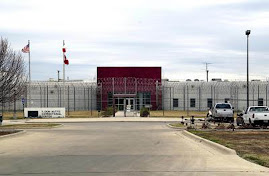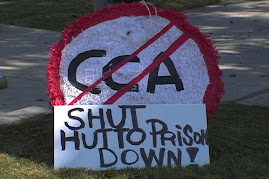Critics push for immigrant detention center in Taylor to close
Enforceable standards, mandated by a federal court, are set to expire Aug. 29.
By Miguel Liscano, Claire Osborn
Sunday, August 02, 2009
Critics of an immigrant detention center in Taylor are stepping up efforts to shut it down as a court mandate for improved conditions at the facility is set to expire.
A 2007 settlement agreement ordered enforceable standards, including external oversight and improved education, nutrition and medical care, at the T. Don Hutto Residential Center, a former medium-security state prison.
But that agreement is scheduled to expire Aug. 29, and questions linger about whether the new standards will continue. Opponents of the 512-bed facility, including the American Civil Liberties Union, have lobbied members of Congress and held protests urging that the facility be closed.
Last week, several people spoke against the facility at the Williamson County Commissioners Court meeting.
"I do not believe that we should be placing the burden of our unresolved issues on children and families while they are waiting for an administrative resolution of their immigrant status," said Allene Booth-Judson, a retired director of special programs, including bilingual education and at-risk programming, at the Round Rock Independent School District. "Our country has many unresolved issues dealing with immigration."
The for-profit facility is operated by Corrections Corp. of America through a contract with Williamson County. The county receives about $15,800 a month from the company.
The Commissioners Court has sent a request to U.S. Immigration and Customs Enforcement and Corrections Corp. of America for written documentation that the standards will be upheld, said Williamson County Judge Dan Gattis.
"My beliefs are that the stipulations sent down by the court should be followed," Gattis said. "The county has little role in this because it's a federal deal."
Corrections Corp. of America spokesman Steve Owen referred questions about future standards at the facility to the immigration and customs agency.
A spokeswoman for ICE, which oversees the center, declined to comment on the matter.
The center, opened in 2006, holds families awaiting adjudication in immigration cases and has been criticized even after the settlement for what some have said are substandard living conditions for those held at the facility.
Detainees hail from all over the world and are seeking asylum or are being held on noncriminal violations of immigration law.
Two years ago , the University of Texas School of Law's Immigration Clinic and the ACLU of Texas won a settlement in a federal suit that accused the government of violating the rights of minors held at the center.
"The conditions at Hutto when we first began to work there in September 2006 and throughout our litigation were deplorable and are an example of what happens without external oversight," said Barbara Hines, director of the immigration clinic. "No modifications to Hutto would have been made without community advocacy and litigation."
The settlement mandated that each family be able to spend an unlimited time together in their rooms with the door open from 8 a.m. to 8 p.m.
It also eliminated scheduled head counts of residents, instead allowing them to check in with staff members three times a day, and ordered that children at the center be given five hours of schooling per day and that adult education classes be provided.
It also mandated that the government provide Spanish-speaking medical staff and a limited number of over-the-counter medications.
The immigration and customs agency also agreed to allow a federal magistrate to conduct periodic on-site reviews of the facility, which will end with the expiration of the settlement.
"I cannot imagine that they will literally roll back the clock and go back to treatment that I think has been roundly condemned as egregious," said Lisa Graybill, legal director for the ACLU of Texas, at a recent news conference. "That said, it is really worrisome to us that there will be no external oversight."
Graybill acknowledged improvements at the facility, but she is still pushing to shut it down.
"Some cosmetic improvements, which are significant, don't change the fact that it's a jail," Graybill said.
Late last year, the county commissioners extended a contract with Corrections Corp. of America for two years. The county has had a contract with the company and U.S. Immigration and Customs Enforcement since 2006 to act as the intermediary between the two and to disburse federal funds for the facility.
Graybill said the county could possibly shut down the facility if it decides to no longer take part in the agreement.
"Whether the government could operate the Hutto detention center absent Williamson County is a harder question," she said.
Monday, August 3, 2009
Austin-American Statesman: Critics push for immigrant detention center to close
Thanks to the Liscano and Osborn for the article, but just to clarify... The Hutto Settlement required that Immigration and Customs Enforcement create and implement Family Residential Standards. The article is referring to the stipulations of In re: Hutto as "enforceable standards." Compliance with this long list of physical and operational changes was overseen by a magistrate at the federal court. The Family Residential Standards, however, are unenforceable and do not include third party or external oversight. The magistrate's final report reflects questionable compliance in a number of areas, even two years after the settlement. Needless to say, this worries us.








